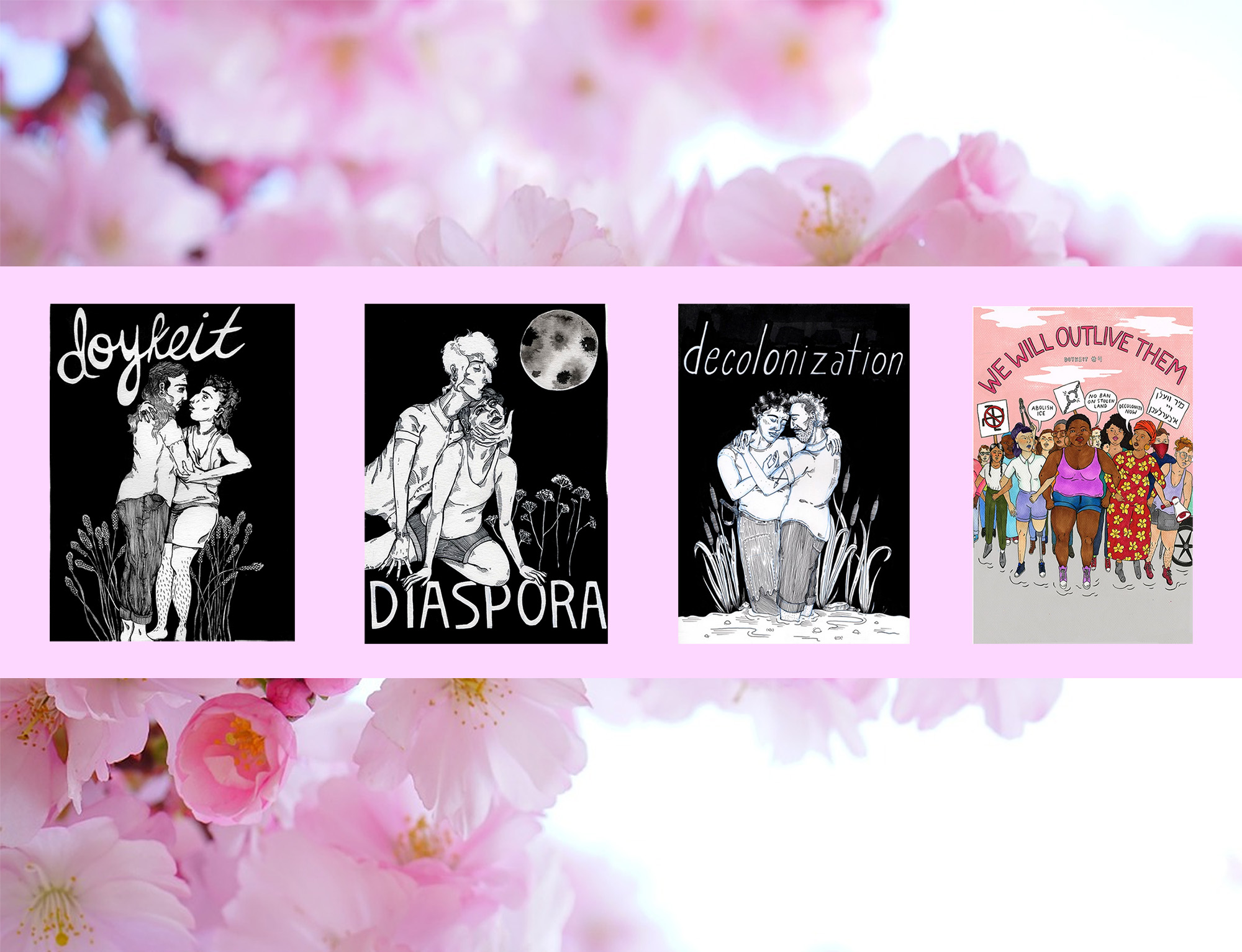Welcome to the Jewish Underground Press! Our Jewish zine review columnist Miranda Sullivan gives us her takes on the most salient Jewish zines in circulation. You can read our columnist’s introduction to our zine review series here.
Editor JB Braeger’s zine series, Doykeit, which in yiddish translates to “hereness,” is a living document. Brager describes the weight the zine holds, telling readers that “Doykeit is a kind of bi-annual-ish yearbook to collect voices that speak to the cross sections of Jewishness and queer identification, and how this may inform anti-Zionist or Palestinian solidarity politics–and increasingly, a broader project of dreaming.” The first zine ever published, also titled “Doykeit,” was in concert with other themes described by their titles: “Diaspora”, “Decolonization,” and “We Will Outlive Them. I read volumes one through four, and the contributors to the zine reflect the cross section of progressive American Jewry. I’d like to take you through those highlights and the lowlights.
Reading each zine, I had to remind myself of this idea of hereness because it is so new to me. I am not sure if it is correct of me to equate “hereness” to being in the present, but it is my inclination to do so. Jewish identity is rooted firmly in our collective past; so much of these zines are individual narratives reckoning with history, American assimilationist culture, colonialism, and Zionism affecting Jews. The writings of hereness reflect the various writers’ mutual and deep desire to understand themselves in the here and now, and to reckon with how history affects our own sense of doykeit.
Of course, I have my criticisms and my adulations. Doykeit #1 dealt with frustrations about Zionist propaganda but at times the tone felt self-pitying and had a notable absence of actually discussing, or even just naming, Palestinian struggle. The introduction to the second Doykeit zine titled “Diaspora” acknowledged the ways in which the zine is limited, and how its reckonings hold contradiction. So, I appreciated the evolution and self-awareness.
The excerpt “Interview with Alexis Mitchell” from Radio613 in “Diaspora” exemplified one instance where I felt anti-Zionist ideologies were being properly spoken on. One line from Mitchell particularly stood out: “I would ask where my family’s from and what does Israel have to do with me? Why is this considered my homeland when my family’s Eastern European? I didn’t feel that connection–it kind of felt really forced for me.” The interview brings up important ideas on colonialism, whiteness, nation-state politics, and overall questions a Zionist logic.
Also in “Diaspora” was Lizzie Busch’s poems which put the idea of galut, literally “exile,” in conversation with the idea of diaspora. Busch expresses a frustration with American values that have been imposed onto Jewishness. David Zinman’s untitled essay followed, where Zinman points out that we have to fight for others or else we will be in exile, perhaps eternally. The zine dealt with both the emotional, poetic side of these struggles with the historical accounts from its contributors. Both worked well, but better together.
Many writers throughout all of the zines touch on the politics of Yiddish, communism, and anarchism. In the zine “Decolonization,” Elijahu Meshudenik writes “Yiddishland: With Yiddish None of this is Possible” and points out that Yiddish defies borders, that the language has never been contained by a nation-state, and arguably has emerged as a result of Jews having none. I appreciate the acknowledgement that “Israeli culture” not only stole from Palestinian and Arab culture, but also actively tried to destroy Eastern European Jewish cultural touchstones, such as Yiddish. The essay moves to the issue of assimilation in America. It’s a timeworn story – today, so many young Jews are reckoning with the sanitization of our cultures, and the ways in which assimilation makes Jews great colonizers, whether in Israel or America, or so the colonial powers want these places to be called.
After reading the third installment of Doykeit, “Decolonization,” I am mostly left wondering if the contributors engaged with Indigenous peoples to inform their writings. I can’t help but think that a collection of white Jewish writings on decolonization fulfills some kind of answer to white-Jewish guilt, as opposed to making real change. I can’t be the one to say what Jews should or should not do to decolonize, so I’m left hoping that the contributors were careful in honoring what Indigenous people actually want from settlers. It is important for Jewish people to do solidarity work; my only worry is that some Jews may speak when they should be listening, which in of itself is a colonial mindset. That being said, it’s evident that many contributors did take their lead from indigenous communities. One message rang true throughout much of the zine: even if we as Jews are anti-Zionist, we still have to reckon with our role as white settlers in North America, even with the complications of diaspora. And hey, maybe this is a call for a reclamation of our Ashkenazi cultures that Zionism once aimed to decimate.
My biggest gripe with the zine series was from “We Will Outlive Them,” which published an essay by Erez Jesse Schwartz justifying his own moving to Palestine. Should Jews be involved with anti-occupation work by occupying Palestine? I don’t think colonizing Palestine as a white Jew helps Palestinians, and to then invoke the idea of tikkun olam on top of that feels like rubbing salt in a wound. I think it’s presumptive of Schwartz to think he’s the right kind of Jew to immigrate to Palestine. He says he moved to “break discriminatory laws and build community with others committed to sharing a future beyond ethnic-nationalism,” but I think it’s more actionable to not add to the Jewish population Israeli laws are made for. To the point of many other authors in the zine, white Jews have plenty of de-colonizing to do in our own communities in North America, and we can’t ignore our participation and complicity in colonialism. I think North American Jews can do anti-occupation work in their very communities — just think of how much money our temples, youth groups, and community organizations give to Israel each year that could go towards Palestinian activists. Above all, it’s important to take the lead from Palestinian people so it’s on us as Jews to know when to ask and when to listen, just as with North American decolonization. I’m not confident Schwartz did either sufficiently.
The end of the zine, however, was moving. In “Tkhine for a time of Teshuvah & Collective Struggle” by Yoyneh, son of Ester Melkeh, Yoyneh writes a prayer for healing. Here, I want to share a good portion of it because of its usefulness for Jews feeling hurt, frustrated, and confused by American, capitalist, and Zionist influences on Judaism:
“See how your Jewish children have gone astray and amiss in this broken world, so many of us taking up the flags of nationalism and militarism. We know too well, dear God, that our people, who survived over a thousand years of unbelievable suffering at the hands of antisemitic Christian Europeans, that today our hands are also bloodied, from over seventy years of oppressing the Palestinian people; that not one of us is innocent and without aveyres mitzvah-beyn-odom-u’veyn-khaveyro, transgression against our fellow human being; we know full well that not one of us can have clean hands in such a broken world, a world ruled by racism, patriarchy, Christian hegemony, and Western imperialism…We have not forgotten the sacred inheritance of our mothers, a tradition of Bundism, Communism, the struggle for a better world, led by the masses.”
When I read Yoyneh’s prayer I felt both relieved and not alone. Our prayer practice can be just even though I have seen so many people that have gone astray. But if we remember our cultures care for people, not wealth or property, then I am deeply moved.
The Doykeit zine series embodies reclamation. We can reclaim our culture from the depths of Zionism. Doykeit makes me want to connect with the yiddish revivalists, the Bundists, the anti-Zionists, and the dreamers. I love the celebration of Eastern European culture. In this world it can feel lonely in capitalism and Zionism. But our Jewishness can be a comfort and a guide in rerooting ourselves to our cultures otherwise sanitized, and our Jewishness can be in itself a friend. We just have to reach out our hands.

